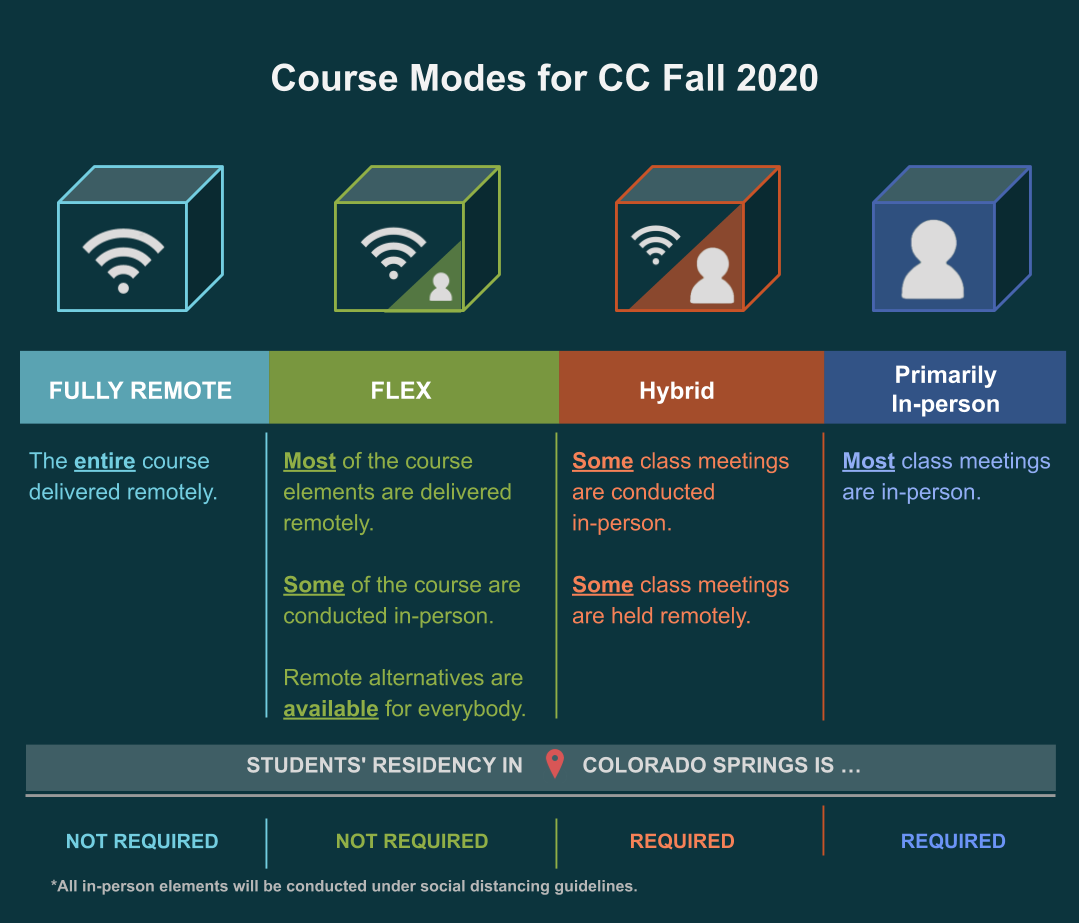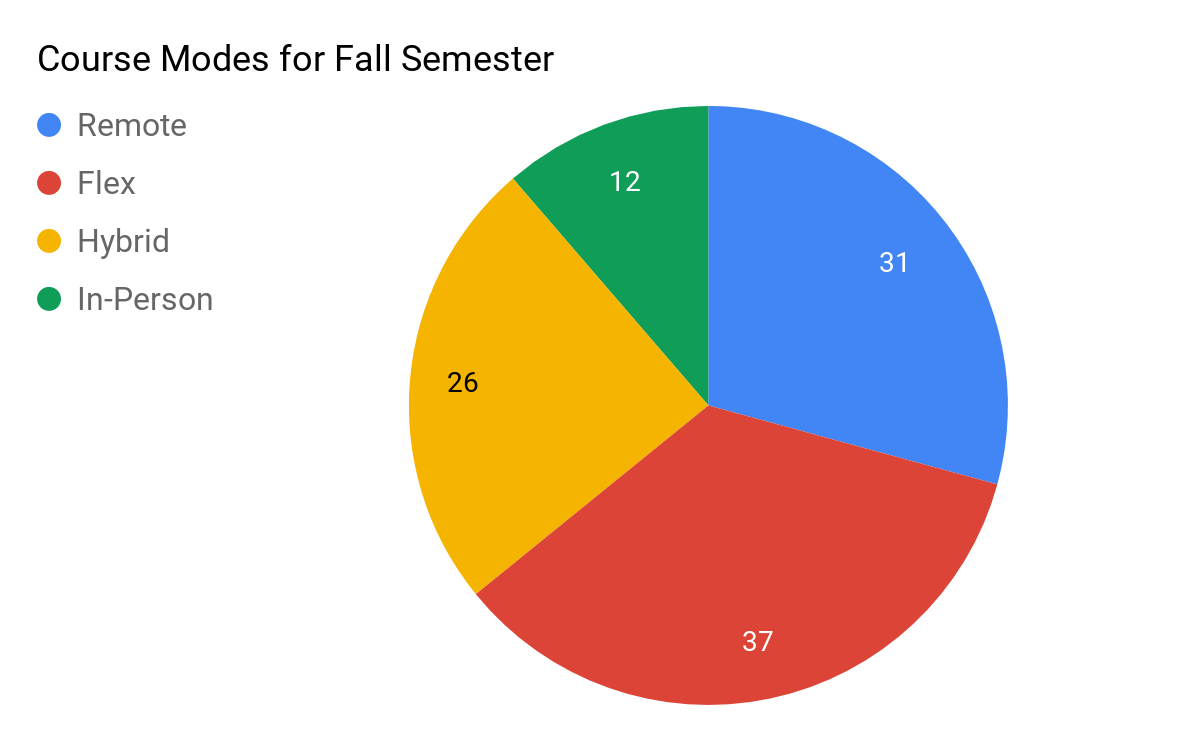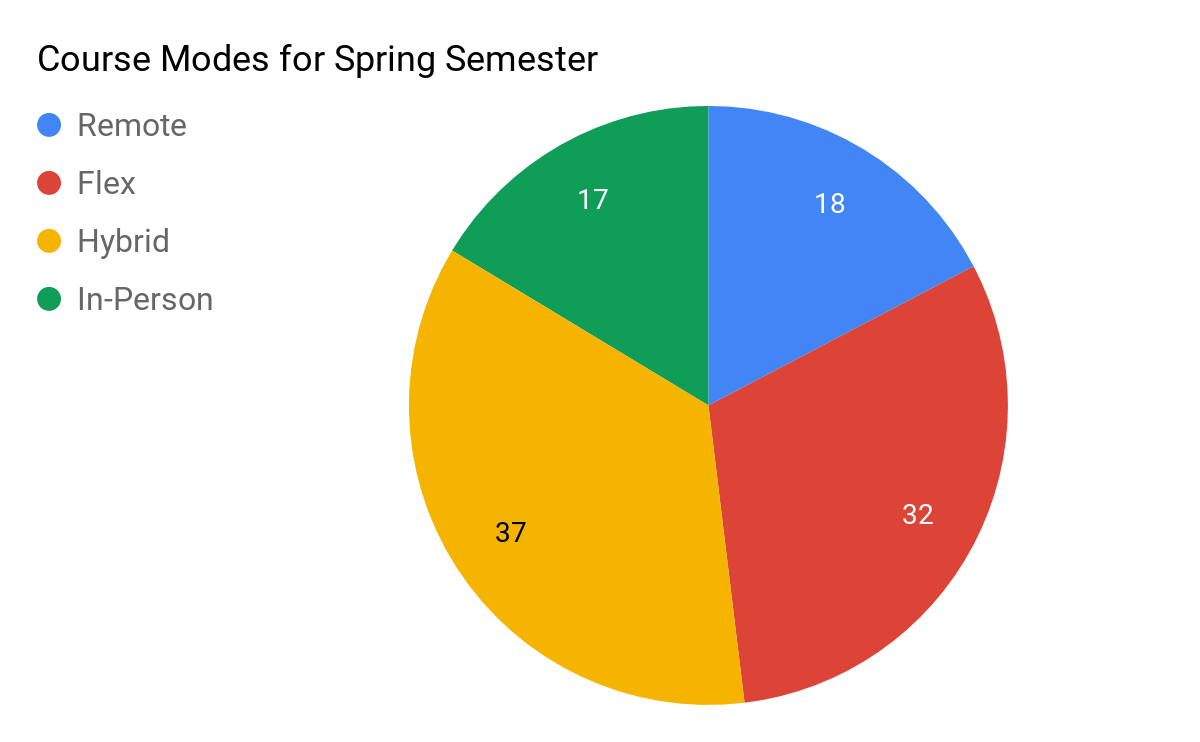What the flex? Meet the four modes of instruction at CC this fall
Plus, three student government leaders on their work this summer and plans for fall
Good morning, and happy Tuesday. On this pre-pandemic date last year, locals were bringing their yoga mats to the Colorado Springs Fine Arts Center for Pop Up Yoga with live music. (The FAC is currently closed, but they are offering a variety of virtual events.)
Today, we break down the different course modes Colorado College plans to offer in the fall, and we’ll tell you which formats are most popular so far among early class schedules. Also, three Colorado College student government representatives explain to us how they’re working to support students in the pandemic. Thanks again to all our new subscribers. If you want to help spread the word about this student-faculty collaborative newsletter, you can use this link.
➡️ICYMI: Yesterday, our resident microbiologist Phoebe Lostroh gave her weekly COVID-19 predictions and talked about risks of virus exposure in El Paso County. (SPOILER: It was dire.)

Infographic by Colorado College students Rana Abdu, Aleesa Chua, Sara Dixon, Jia Mei, and Lindsey Smith.
Hybrid vs. Flex: Professors have started to choose how they’ll teach courses this year. These are their options
As Colorado College readies to welcome some students back to campus in less than a month, faculty are busy preparing their courses, and students are waiting to find out what their classes will look like. Some departments have sent out modified course schedules for the fall to explain the four different course modes the classes may follow.
First, let’s explain the different course modes:
Fully Remote: The entire course will be remote, and students do not need to be in Colorado Springs to enroll. Fully remote classes allow students to participate from wherever they are living, and the professor will also be working remotely. This option might be best for those concerned about working in-person or traveling to campus.
Flex: Students do not have to be living in Colorado Springs to participate in a flex course. Some parts of the class will be face-to-face, but most elements will be remote. For all in-person parts, the professor will come up with a remote alternative. This gives students more flexibility to choose how they want to participate in class, hence the name “flex.” Professors choosing this category do not necessarily have to engage in-person and remote students simultaneously, but for those who choose to, the college has limited equipment available for use, such as cameras and speakers. A flex course allows students who are comfortable working in-person to participate in face-to-face components, but students who wish to complete the course entirely remotely are also able to complete all coursework through distance learning.
Hybrid: Some elements of the class are in-person, and some are remote. Students only participating in distance-learning may not be able to complete the entire class, so to enroll, students must be living in Colorado Springs. For example, in a hybrid course, we imagine a lecture could take place online, but a lab or hands-on exercise for the class could take place in person. This could reduce the number of face-to-face interactions but allows some in-person learning.
Primarily in-person: Classes will be mostly in-person. Students are required to live in Colorado Springs to take these courses. In-person courses are best for students who can’t learn well online, do not have health concerns, and plan to return to the Springs in the fall.
At least eight departments have already posted their preliminary course grids for the year, including the format each course will take. Here’s how those courses are broken down:

For the 2020-21 school year, we found 210 courses had already posted their format as of July 27. Of those courses so far, 33% (69 courses) are flex; 30% (63 courses) are hybrid; 23% (49 courses) are fully remote; and 14% (29 courses) are primarily in-person.

Of the 106 posted courses for the first semester so far, 35% (37 courses) are flex; 29% (31 courses) are fully remote; 25% (26 courses) are hybrid; and 11% (12 courses) are primarily in-person.

Of the 104 posted courses for the second semester so far, 36% (37 courses) are hybrid; 31% (32 courses) are flex; 17% (18 courses) are fully remote; and 16% (17 courses) are primarily in-person, including nine courses abroad.
Student-governing a pandemic: What three CCSGA reps are working on this summer
Last week, The CC COVID-19 Reporting Project connected over Zoom with three Colorado College Student Government Association, or CCSGA, leaders to talk about how the pandemic is affecting CCSGA operations and how they are preparing for the fall semester.
Sakina Bhatti ’22, CCSGA President
To say CCSGA President Sakina Bhatti ’22 is busy right now would be an understatement. In a typical week, she spends about 30-40 hours on Zoom, she says.
How Bhatti spends those hours: She’s a member of the college’s Presidential Search Committee, which recently moved into the “recruitment” phase. She’s also working to create a podcast about what life is like for students on the Block Plan with Steven Hayward, Journalism Institute Director and Associate Professor of English, through a Student-Faculty Collaborative Grant. As CCSGA president, she also attends five to seven meetings a week about CCSGA work — something student representatives are not paid for because CCSGA doesn’t usually meet during the summer.
“None of us are paid for summer work,” Bhatti says. “So it’s mostly just like, … I was interested enough to do this.”
During recent meetings, Bhatti has worked to dispel “wild” rumors about what this fall might look like, and she is helping with a new communications plan to inform students about mask wearing and social distancing. Bhatti is also involved in creating a pledge that includes clauses about diversity and harassment as well as mask wearing.
This year, students will pay a $474 student activity fee, which funds CCSGA. There are discussions about reducing the student activity fee if campus were to close again during the semester, Bhatti says.
“I would personally push back against [that] just because there’s still events happening,” she says. “But I think that it’s important to recognize that is still a … fee that a lot of students are taking out loans to pay, so we should be considering whether or not it’s something that’s relevant or necessary to pay right now, especially if we’re not on campus.”
Looking toward this fall, Bhatti is hoping to return to campus for Block 1, but she expects to do committee work online and continue having virtual student government meetings. Events like the club fair, two evenings early in the school year when student leaders converge on Worner Campus Center and encourage new students to join their organization, are still scheduled for Block 1, but they will likely be virtual.
Sophie Cardin ’22, Vice President of Outreach
COVID-19 impacted Colorado College campus life plenty — including participation in student government. Consider this: In the spring, CCSGA saw an increase in students running for student government positions, which their “Year in Review” report describes as a “recent record.”
“I think that we’re seeing that students are participating more in the administration both formally and through grassroots routes, which is really impressive,” says Sophie Cardin ’22, CCSGA’s Vice President of Outreach.
During Block 7, seven students ran for Senior Representative; four ran for Junior Representative; five ran for Sophomore Representative; nine ran for finance representative; and nine ran for inclusion representative. Usually, candidates running for Full Council positions have to submit candidacy petitions with 25 signatures, but because of the pandemic, all a student needed to submit was an application for candidacy. To accommodate for different time zones, ballots were open for 24 hours. There was a 35.18% voter turnout in the election, according to an email from Vice President of Internal Affairs Ian Roberson ’21.
While more candidates were participating in CCSGA elections, CCSGA was also confronting challenges around CC students voting in the Colorado primary elections this spring.
In an ordinary year, Colorado College students are living on campus during elections. They receive ballots in their Worner boxes, and return it to a student volunteer camped in downstairs Worner, who makes sure all the ballots are properly returned.
“But this year, we were all not on campus when we were voting,” Cardin says. “There was no access to the Worner Center, so all of the mail was being automatically forwarded. But you cannot forward a ballot, so instead it is returned to the county, and that person’s voter registration is inactivated, which means that voter then won’t receive any ballot in subsequent elections.”
In preparation for the June primary elections, Cardin and the Outreach Committee worked with the CC Votes Committee to lead a communications effort to encourage students to change their mailing addresses on their voter registrations. For students who didn’t change their addresses in time, the Outreach and CC Votes Committees are working to get those registrations reactivated. Now, they are meeting with the Colorado Secretary of State office to advocate for changing rules so this situation doesn’t happen again, Cardin says.
Another obstacle the committees are trying to get around is how to register first-year students to vote during move-in, now that most upperclassmen will not be on campus and the college is closed to visitors. Last year’s efforts resulted in registering more than 100 first-years during move-in. CCSGA will still be leading voter registration efforts for first-years, but Cardin says some of it will happen through virtual town halls. They are also trying to recruit upperclassmen who are approved to be on campus in the fall and train them in voter registration, so they can register first-years through socially-distanced meet-ups.
Lilly Davis ’22, Vice President of Finance
For the 2020-21 academic year, the college’s budget has been reduced by about 5%, according to CCSGA Vice President of Finance Lilly Davis ’22. CCSGA is funded by the annual Student Activity Fee, so its funding remained relatively stable.
Last year, CCSGA allocated $115,000 for student organization operating budgets. This year, CCSGA has $110,000 to disperse to 75 clubs, who requested a combined total of $155,830. As a result, some organizations were not granted the full amounts they requested in April.
In a June email to one of our correspondents serving as a club leader this fall, the CCSGA Finance Committee explained that in addition to new operating budgets for fall, up to half of a student group’s spring budget can roll over into their fall budget. The committee also wrote they will post all requested and granted amounts of club funding online after budgets are finalized later this summer.
“The problem was significantly more clubs requested budget this year for significantly more money,” Davis says.
However, Davis says she is understanding of special circumstances and may bend the rules a bit to help student groups this fall. For example, if an organization was planning to order books for their members to read on campus, they may now have to pay to ship the books to everyone at home, which will create an added cost.
“I want to make sure that groups actually get money and are able to do things this year, even with all the ridiculousness,” Davis says.
Despite that ridiculousness, some annual events will try new ways to proceed for Pandemic Fall. For example, Mountainfilm, a documentary film festival that comes to campus every year, is considering hosting its annual event as a mix of on-campus in an outdoor venue and online.
Davis is expecting a rush of events on campus when everyone returns and gets the green-light to resume in-person programming. In the meantime, she encourages student leaders to continue planning events.
“Don’t give up, ... host events,” Davis says. “Try, even if it sucks.”
About the CC COVID-19 Reporting Project
The CC COVID-19 Reporting Project is a student-faculty collaboration by Colorado College student journalists Miriam Brown and Arielle Gordon, Journalism Institute Director Steven Hayward, Visiting Assistant Professor of Journalism Corey Hutchins, and Assistant Professor of English Najnin Islam. Work by Phoebe Lostroh, Associate Professor of Molecular Biology at CC and National Science Foundation Program Director in Genetic Mechanisms, Molecular and Cellular Biosciences, will appear from time to time, as will infographics by Colorado College students Rana Abdu, Aleesa Chua, Sara Dixon, Jia Mei, and Lindsey Smith.
The project seeks to provide frequent updates about CC and other higher education institutions during the pandemic by providing original reporting, analysis, interviews with campus leaders, and context about what state and national headlines mean for the CC community.
📬 Enter your email address to subscribe and get the newsletter in your inbox each time it comes out. You can reach us with questions, feedback, or news tips by emailing ccreportingproject@gmail.com.


